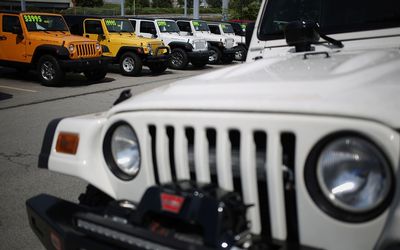THE world of professional communications is an interesting place. As an editor of a magazine supplement to this newspaper, I get to spend a great deal of my time on the receiving end of the output from communications professionals.
When I first typed that sentence I originally wrote "effluent", but thought it was a bit harsh. That’s because there are people and companies who really get it.
The CEOs who regard communications as an equal partner to operations, accounting and human resources, and spend time and effort finding the best people, are those for whom the world "effluent" is unfair.
A friend of mine recently sat in on a board meeting of one of the world’s biggest companies in the US. He said it struck him how the communications director sat directly to the CEO’s right, and it was to him that the CEO looked for support in the harder moments.
But, heavens, there’s a lot of dross out there; a lot of poorly targeted, time-wasting and unprofessional nonsense in my inbox. What amazes me is how very clear it is that, properly done, communications will contribute powerfully to the bottom line.
In SA we’ve seen a couple of companies struggle when their lack of a proper communications strategy, especially in a crisis, caught them short. Lonmin, for example, may never fully recover from Marikana, but the damage to the company’s reputation, in my opinion, could have been mitigated if they’d had a plan — or at least a better one.
When it comes to reputational damage in the motor industry, we’ve seen several companies have a very bad time. Toyota had a rough spell a few years back when they faced (spurious, it turns out) claims that cars were accelerating of their own accord, that throttles were getting stuck wide open and so forth.
But I do feel a trifle sorry for Fiat Chrysler with the incident that took place recently in the US. A journalist from Wired magazine organised a demonstration by two hackers. The Jeep Cherokee the journalist was driving was hacked from a couch 15 or so kilometres away, as he drove at 120km/h down a freeway.
It’s a pretty alarming tale. The hackers, by ascertaining the car’s IP address, managed to gain access to control of the throttle, the brakes, the radio, the aircon and the windscreen wipers.
...
AT THE time of publication, they said they could only access the steering if the car were in reverse — hardly encouraging. The car still ended up in a ditch with the writer, who was expecting the hack, pretty shaken up.
I feel sorry for Fiat Chrysler because they’ve addressed the loophole in their programming that made the hack possible. In the Wired story the hackers referred to the weakness as a "super-nice vulnerability", but the patch has been available for a few weeks.
But it does raise broader questions, and not so much about the advancing technical nature of the modern motor car. It’s no longer news that the first diagnostic test mechanics do these days is with a laptop, nor is it news that car owners want internet radio, connectivity, WiFi hotspots and seamless mobile communications in their cars.
What this demonstrates for me is that, in places, the car industry is behind the curve in comparison with the big tech firms. The fact that both Google and Apple are known to be working on automotive projects has the industry genuinely rattled.
As cars become ever more autonomous, the "driver" will have ever more time to do other things. And as mobile devices, only the very, very best cars come anywhere near the kind of user interface and experience that the likes of Apple can offer — a good example being the really excellent Volvo XC90 I wrote about last week.
Now, Jeep’s people will know that what happened the other day unfairly singles the brand out for a very negative spotlight. There have been rumblings about this kind of thing for years, and I’m quite sure other cars, over the years, have had similar security flaws.
...
THE good thing is that they’re fixing it. Such a bad communications disaster is the Wired story that, as it ought to be, communications concerns will be at the heart of what drives the company to make better, more secure systems.
Simply put, the uniquely powerful combination of freedom of speech (Wired) and free markets (folk don’t have to buy a Jeep…) has meant a serious problem has been spotted and fixed quickly.
Naturally the US government, which has been entirely absent from this nonsense, wants to take the credit. A bill is being prepared to go before the senate that will impose digital security standards on the motor industry.
This will mean that US senators will get to justify their existence and call themselves campaigners for road safety.
But my concern is that the very opposite will happen. This industry moves so fast, and this particular part of it is simply stellar in the way it improves month by month. Any legislation will be comically out of date by the time they get round to passing it.
More dangerously, it will offer a perverse incentive for the motor companies. If I were them I’d be thrilled about this idea of legislation. Because the moment the legislation is passed, they get to call themselves "compliant".
They get to put their hands up in the air and say, "Hey, we adhere to these really strict laws that government has put in place. Go talk to them."
...
IT’s a magnificent opportunity for these companies to absolve themselves of direct responsibility for not doing their jobs properly. It’s hard to sue somebody who’s compliant in every way.
That’s why if the senate wants to do American motorists a favour, they should just butt out.
The Jeep/Wired affair has highlighted a problem that will have the full attention of all motor companies that, understandably, do not want a similar embarrassment to befall them.
If I were doing communications for Fiat Chrysler I’d be dead set on these new laws. I’d position the firm as "working with all relevant agencies to ensure the safety of American motorists" or something to that effect.
But in truth, the best people to fix the cars are the car people, and the best people to monitor them are drivers and the media.
The Wired story, and Jeep’s response, proves it.

Jeep Rubicon vehicles are displayed at a dealership. Jeep’s reputation took a hit when hackers managed to gain access to a Jeep Cherokee vehicle. Picture: BLOOMBERG/LUKE SHARRETT
THE world of professional communications is an interesting place. As an editor of a magazine supplement to this newspaper, I get to spend a great deal of my time on the receiving end of the output from communications professionals.
When I first typed that sentence I originally wrote "effluent", but thought it was a bit harsh. That’s because there are people and companies who really get it.
The CEOs who regard communications as an equal partner to operations, accounting and human resources, and spend time and effort finding the best people, are those for whom the world "effluent" is unfair.
A friend of mine recently sat in on a board meeting of one of the world’s biggest companies in the US. He said it struck him how the communications director sat directly to the CEO’s right, and it was to him that the CEO looked for support in the harder moments.
But, heavens, there’s a lot of dross out there; a lot of poorly targeted, time-wasting and unprofessional nonsense in my inbox. What amazes me is how very clear it is that, properly done, communications will contribute powerfully to the bottom line.
In SA we’ve seen a couple of companies struggle when their lack of a proper communications strategy, especially in a crisis, caught them short. Lonmin, for example, may never fully recover from Marikana, but the damage to the company’s reputation, in my opinion, could have been mitigated if they’d had a plan — or at least a better one.
When it comes to reputational damage in the motor industry, we’ve seen several companies have a very bad time. Toyota had a rough spell a few years back when they faced (spurious, it turns out) claims that cars were accelerating of their own accord, that throttles were getting stuck wide open and so forth.
But I do feel a trifle sorry for Fiat Chrysler with the incident that took place recently in the US. A journalist from Wired magazine organised a demonstration by two hackers. The Jeep Cherokee the journalist was driving was hacked from a couch 15 or so kilometres away, as he drove at 120km/h down a freeway.
It’s a pretty alarming tale. The hackers, by ascertaining the car’s IP address, managed to gain access to control of the throttle, the brakes, the radio, the aircon and the windscreen wipers.
...
AT THE time of publication, they said they could only access the steering if the car were in reverse — hardly encouraging. The car still ended up in a ditch with the writer, who was expecting the hack, pretty shaken up.
I feel sorry for Fiat Chrysler because they’ve addressed the loophole in their programming that made the hack possible. In the Wired story the hackers referred to the weakness as a "super-nice vulnerability", but the patch has been available for a few weeks.
But it does raise broader questions, and not so much about the advancing technical nature of the modern motor car. It’s no longer news that the first diagnostic test mechanics do these days is with a laptop, nor is it news that car owners want internet radio, connectivity, WiFi hotspots and seamless mobile communications in their cars.
What this demonstrates for me is that, in places, the car industry is behind the curve in comparison with the big tech firms. The fact that both Google and Apple are known to be working on automotive projects has the industry genuinely rattled.
As cars become ever more autonomous, the "driver" will have ever more time to do other things. And as mobile devices, only the very, very best cars come anywhere near the kind of user interface and experience that the likes of Apple can offer — a good example being the really excellent Volvo XC90 I wrote about last week.
Now, Jeep’s people will know that what happened the other day unfairly singles the brand out for a very negative spotlight. There have been rumblings about this kind of thing for years, and I’m quite sure other cars, over the years, have had similar security flaws.
...
THE good thing is that they’re fixing it. Such a bad communications disaster is the Wired story that, as it ought to be, communications concerns will be at the heart of what drives the company to make better, more secure systems.
Simply put, the uniquely powerful combination of freedom of speech (Wired) and free markets (folk don’t have to buy a Jeep…) has meant a serious problem has been spotted and fixed quickly.
Naturally the US government, which has been entirely absent from this nonsense, wants to take the credit. A bill is being prepared to go before the senate that will impose digital security standards on the motor industry.
This will mean that US senators will get to justify their existence and call themselves campaigners for road safety.
But my concern is that the very opposite will happen. This industry moves so fast, and this particular part of it is simply stellar in the way it improves month by month. Any legislation will be comically out of date by the time they get round to passing it.
More dangerously, it will offer a perverse incentive for the motor companies. If I were them I’d be thrilled about this idea of legislation. Because the moment the legislation is passed, they get to call themselves "compliant".
They get to put their hands up in the air and say, "Hey, we adhere to these really strict laws that government has put in place. Go talk to them."
...
IT’s a magnificent opportunity for these companies to absolve themselves of direct responsibility for not doing their jobs properly. It’s hard to sue somebody who’s compliant in every way.
That’s why if the senate wants to do American motorists a favour, they should just butt out.
The Jeep/Wired affair has highlighted a problem that will have the full attention of all motor companies that, understandably, do not want a similar embarrassment to befall them.
If I were doing communications for Fiat Chrysler I’d be dead set on these new laws. I’d position the firm as "working with all relevant agencies to ensure the safety of American motorists" or something to that effect.
But in truth, the best people to fix the cars are the car people, and the best people to monitor them are drivers and the media.
The Wired story, and Jeep’s response, proves it.





















Post a comment